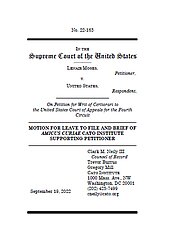Learn more about Cato’s Amicus Briefs Program.
Lenair Moses on two occasions sold $40 worth of crack cocaine to a confidential informant of the police and ended up pleading guilty to two counts of distributing a controlled substance in violation of federal law. The base sentencing range for Moses’s offenses would have usually been 21–27 months imprisonment. But because the U.S. Sentencing Commission’s commentary to the sentencing guidelines state that Moses’s 2013 guilty plea for selling crack cocaine qualify him for the status of “career offender,” Moses’s sentencing range more than quintupled to 151–188 months.
This case is about whether and when the commentary to the sentencing guidelines should be given controlling weight by sentencing courts. On those grounds, Moses objected to the sentencing enhancement, noting that the guidelines themselves—not the commentary to the guidelines—provide that a prior conviction doesn’t qualify a defendant for career-offender status when it involves “relevant conduct” to the current offense. Ultimately, the district court rejected Moses’s argument. On appeal, the Fourth Circuit likewise rejected his position solely because it believed that it was bound to apply the commentary’s interpretation of the guidelines.
The guidelines, like regulations issued by other federal agencies, are for the most part legally binding. And since the U.S. Supreme Court’s 1993 decision in Stinson v. United States, judges usually have given authoritative weight to the commentary as well. But that type of deference was altered by the recent Supreme Court opinion in Kisor v. Wilkie. Now courts are to withhold deference to an agency’s interpretation of its own regulations (such as the commentary to the sentencing guidelines) unless (at a minimum) the regulation is “genuinely ambiguous.” The Fourth Circuit, however, concluded that the holding in Kisor doesn’t apply to the commentary to the sentencing guidelines.
The Fourth Circuit’s decision gives Supreme Court an opportunity to answer whether the lower courts should keep rigidly deferring to the commentary without doing their own interpretative work. Moses has asked the Supreme Court to decide that issue, and Cato has filed an amicus brief supporting his petition.
We argue that the Fourth Circuit was wrong to give controlling weight to the commentary without applying the test announced in Kisor. In Kisor, the Court paired down the deference that courts give to agencies when they interpret their own regulations. Deference to the Sentencing Commission’s commentary is exactly that kind of deference to agency self‐interpretation which must be similarly restricted. Rather than deferring the Sentencing Commission’s later interpretations of its guidelines, courts should apply the rule of lenity, which holds that ambiguities in criminal laws should be resolved in the defendant’s favor. While deference to the Sentencing Commission’s interpretations may advance certain policy goals like agency expertise, the rule of lenity embodies more profound constitutional concerns of fair notice of separation of powers. That rule should thus come before deference to agencies in the criminal context.
If the Court fails to take this case and the Fourth Circuit’s decision is upheld, American citizens will continue to spend additional years in prison on the basis of bureaucratic interpretations that are not law. The Supreme Court should take this opportunity to make clear that the courts of appeals should stop excessively deferring to the commentary and instead look to the actual law.

This work is licensed under a Creative Commons Attribution-NonCommercial-ShareAlike 4.0 International License.


